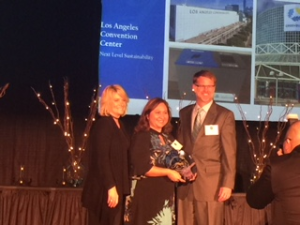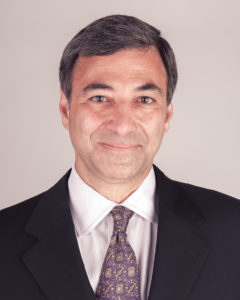Los Angeles Convention Center Wins State’s Highest Environmental Honor
The Los Angeles Convention Center and the Orange County Water District are among 13 recipients of the state’s highest environmental honor.
The Governor’s Environmental Leadership Awards, which were established in 1993, are given to individuals, organizations and businesses that have demonstrated leadership and made notable contributions to conserving the state’s resources, protecting the environment and strengthening the economy, according to the California Environmental Protection Agency.
“This year’s GEELA recipients are demonstrating exceptional leadership in addressing some of our most significant environmental challenges,” said California Secretary for Environmental Protection Matthew

Estella Flores, facilities/operations manager, receives the award.
The OCWD was cited for its educational programs that inform the public about recycled water and its benefits, while the Convention Center was lauded for a sustainability program that has reduced waste, conserved water and cut its carbon footprint, according to CalEPA.
Other award recipients include BMW of San Diego, the only winner in the automobile dealer zero emission vehicle promotion category, for promoting the sale of zero-emission vehicles through a variety of partnerships and programs; and the Chumash Casino Resort in Santa Barbara County for reducing its waste stream and lowering recycling costs.
South Point Arena And Equestrian Center Installs State-Of-The-Art Daktronics Display System
South Point Hotel, Casino and Spa continues a long-standing relationship with Daktronics with the installation of a new state-of-the-art, four-sided video display system for the property’s Arena and Equestrian Center in Las Vegas, Nevada.
The new, 4-millimeter line spacing video displays replace the previous Daktronics centerhung technology installed in 2006 and nearly triples its size. The 4-millimeter spacing makes the new screen among the  tightest LED resolutions of any centerhung video display in any arena in the country. The 13,797-pound display will be suspended from the ceiling of the 4,600-seat arena.
tightest LED resolutions of any centerhung video display in any arena in the country. The 13,797-pound display will be suspended from the ceiling of the 4,600-seat arena.
The two larger “sideline” screens measure 12.5 feet high by 21.5 feet wide while the two smaller “end zone” screens measure 14 feet high by 9.5 feet wide. In addition, the panels are comprised of 588 individual modules with a total of 2,718,912 pixels at three LEDs per pixel, totaling more than 8.1 million LEDs.
“Michael Gaughan and South Point’s relationship with Daktronics began well before the property opened in December 2005,” said Steve Stallworth, South Point Arena and Equestrian Center General Manager. “When Michael Gaughan first built the Orleans Arena he used Daktronics exclusively and purchased the first ‘ring beam’ LED fascia in Nevada at that time. When he opened the South Point, he purchased Daktronics screens for the Arena and his state-of-the-art tournament Bowling Plaza. Daktronics was the only company in the business that we trusted to provide us with the quality and experience we were looking to deliver to our guests.”
The new displays are each capable of variable content zoning, allowing each to show one large image or multiple windows of content. As a result, the system can show any combination of live video, instant replays, real-time event results and statistics, graphics and animations, and sponsorship messages.
Michael J. Sawaya Named President/General Manager Of The New Orleans Ernest N. Morial Convention Center
The Ernest N. Morial New Orleans Exhibition Hall Authority has named Michael J. Sawaya as president and general manager of the New Orleans Ernest N. Morial Convention Center and executive vice president of the Authority. He succeeds Robert L. “Bob” Johnson, who retired on September 25 after 10 years of service.
“We could not be more pleased with the selection of Michael Sawaya to lead our Convention Center to its next level of success,” said Melvin  Rodrigue, Authority president. “He comes to New Orleans with a skill set and experiences that are the right fit at the right time. He recently led the Henry B. Gonzalez Convention Center through a major renovation, including the development of a convention headquarters hotel, that has shined a bright light on San Antonio as a major convention destination. The Authority had an impressive slate of candidates to choose from in a nationwide search. The Selection Committee and my fellow Commissioners were very diligent in making the right choice.”
Rodrigue, Authority president. “He comes to New Orleans with a skill set and experiences that are the right fit at the right time. He recently led the Henry B. Gonzalez Convention Center through a major renovation, including the development of a convention headquarters hotel, that has shined a bright light on San Antonio as a major convention destination. The Authority had an impressive slate of candidates to choose from in a nationwide search. The Selection Committee and my fellow Commissioners were very diligent in making the right choice.”
Sawaya, a 40-year veteran of the hospitality industry, comes to New Orleans from San Antonio, TX, where he served as Executive Director of the Convention and Sports Facilities (CSF) Department for the City of San Antonio. In his role as Executive Director, he oversaw operations of the Henry B. Gonzalez Convention Center, Lila Cockrell Theatre, Alamodome, and Asset Management and ground lease management for the Nelson Wolfe Baseball Stadium, Toyota Field Soccer Stadium, and the Grand Hyatt Hotel.
Sawaya’s career with the City of San Antonio began in 2003, when he was hired to merge the Convention Facilities and Alamodome departments. Most recently, he directed the $325 million expansion of the Henry B. Gonzalez Convention Center – the largest single capital improvement project in the history of the City of San Antonio, and recently completed a $60 million renovation of the Alamodome. He served as Interim Aviation Department Director from 2008 – 2009 before returning to his role as Executive Director of the CSF Department in 2009.
Before joining the City of San Antonio, he served as General Manager of the Omni Severin Hotel in Indianapolis, IN, the Omni San Antonio Hotel, and 11 other hotels around the country. He also served as Chairman of the San Antonio Convention and Visitors Commission, President of the San Antonio Hotel and Lodging Association, as an executive committee member of the San Antonio Area Tourism Council, and on the board of directors of the Greater San Antonio Chamber of Commerce.
“I am thrilled at the opportunity to lead the New Orleans Ernest N. Morial Convention Center and to become a part of the New Orleans community,” said Sawaya. “New Orleans’ storied reputation as a world-class city and convention destination make it the ideal fit for me and my family, and I am excited about the vision for the future that together we will execute over the course of my tenure.”
Registration Now Open For 2018 Venue Operations Summit
Venue Solutions Group (www.venuesolutionsgroup.com), an industry leader in operational consulting to the public assembly facility industry, announced that registration is now open for the 2018 Venue Operations Summit (www.venueopssummit.com). The Venue Operations Summit (VOS), now in its fourth year, will take place in Nashville, TN, Sunday, April 29 through Tuesday, May 1, 2018 at the Nashville Downtown Hilton
Hotel.
VOS is the premier industry conference for public assembly facility operations and engineering professionals. This year’s topics include  leadership, risk management in housekeeping, vertical transportation maintenance, electrical system management, venue-specific Town Halls, life safety, and much more. Regardless of venue type, attendees can be assured of a program that will provide actionable information to assist them in their facility responsibilities along with very valuable networking opportunities. Keynote speakers include industry veteran Richard Andersen, CFE, who will focus on how to become a better leader.
leadership, risk management in housekeeping, vertical transportation maintenance, electrical system management, venue-specific Town Halls, life safety, and much more. Regardless of venue type, attendees can be assured of a program that will provide actionable information to assist them in their facility responsibilities along with very valuable networking opportunities. Keynote speakers include industry veteran Richard Andersen, CFE, who will focus on how to become a better leader.
“We have created a meaningful opportunity for venue operations and engineering staff, employees who are often overlooked when it comes to professional development,” said VSG’s Managing Partner, Russ Simons. “Engineering, maintenance, event setup, security, and housekeeping are all vital components to a successful venue, and they should have the same educational opportunities as the sales, marketing, premium and
box office staff.”
Established in 2015 and held annually in Nashville, Venue Operations Summit fills a special need for shared knowledge, best practices, and networking recognizing an integral workforce element in sports, entertainment, performing arts, and convention facilities. The Summit, spanning three days, includes general sessions and breakouts, as well as tours of local facilities and an Opening Reception for attendees to get to know each other.
Industry Veteran Eric Granger Joins AEG Facilities As KFC Yum! Center General Manager
Eric Granger, an industry veteran with more than 20 years in the live entertainment, sports and facilities management industries, has been named General Manager of KFC Yum! Center in Louisville, Kentucky. The announcement was made by Bob Newman, President of AEG Facilities, operators of the arena.
“We are thrilled to have Eric join the AEG Facilities and KFC Yum! Center team in Louisville,” said Newman. “Eric brings a great depth of  knowledge and industry experience and will play a key role in the continued success and stellar reputation of one of the region’s premier and busiest destinations for sports and entertainment.”
knowledge and industry experience and will play a key role in the continued success and stellar reputation of one of the region’s premier and busiest destinations for sports and entertainment.”
“KFC Yum! Center is pleased to welcome Eric Granger and his family to Kentucky. Eric’s experience and talent will help maintain the arena’s reputation as one of the finest venues in the world,” added Scott C. Cox, Chairman, Louisville Arena Authority.
As General Manager, KFC Yum! Center, Granger will be responsible for the management of all of the arena’s business operations, the creation of new events and the development of new revenue opportunities for the seven-year old, 22,000-seat sports and entertainment arena which serves as the home of the University of Louisville men’s and women’s basketball programs. Granger will also oversee numerous proprietary initiatives of AEG Facilities including AEG S.A.F.E., AEG 1Source, AEG 1EARTH, AEG 1Force, AEG Encore and AEG Energy Services, in addition to working closely with AEG Global Partnerships and other divisions of the company.
Granger will assume the role of General Manager last held by Dennis Petrullo who resigned earlier in the month.
Prior to joining AEG Facilities and KFC Yum! Center, Granger spent seven years serving as the Vice President and General Manager for Memphis, Tennessee’s 18,119-seat FedEx Forum, home to NBA’s Memphis Grizzlies and University of Memphis Tigers in addition to serving as General Manager of the Nationwide Arena in Columbus, Ohio, home of the NHL Blue Jackets.
“I am looking forward to working with the great group of professionals in Louisville with AEG Facilities and the Louisville Arena Authority,” said Granger. “KFC Yum! Center is an incredible facility.”
A graduate of University of South Alabama, Granger assumed his new role on January 1, 2018.
Do you want to receive a Front Row News weekly digest?
Categories
- Allied (861)
- Architecture (147)
- Arenas (747)
- Career (897)
- Convention Centers (895)
- Education (623)
- Events (1,544)
- Food & Beverage (193)
- Foundation (113)
- Guest Experience (1,496)
- Industry News (2,270)
- Leadership (1,888)
- Marketing (150)
- Membership (2,000)
- Music (213)
- Performing Arts Centers (454)
- Professional Development (409)
- Research (127)
- Safety & Security (442)
- Sports (763)
- Stadiums (608)
- Student (159)
- Technology (516)
- Ticketing (92)
- Touring (82)
- Trends (364)
- Uncategorized (747)
- Universities (218)
- Video (25)
- Young Professional (198)
Twitter Feed
- Twitter feed loading
Recent Posts
- Raleigh Convention Center Reopening Following December Fire
- Welcome to Our Newest Members
- VenuWorks Selected To Manage Historic Paramount Arts Center In Ashland
- Miami Beach Convention Center Wraps a Milestone Year
- Venuworks and ATG Entertainment Selected to Manage Fresno Convention and Entertainment Center
Categories
- Allied
- Architecture
- Arenas
- Career
- Convention Centers
- Education
- Events
- Food & Beverage
- Foundation
- Guest Experience
- Industry News
- Leadership
- Marketing
- Membership
- Music
- Performing Arts Centers
- Professional Development
- Research
- Safety & Security
- Sports
- Stadiums
- Student
- Technology
- Ticketing
- Touring
- Trends
- Uncategorized
- Universities
- Video
- Young Professional
Archives
- January 2026
- December 2025
- November 2025
- October 2025
- September 2025
- August 2025
- July 2025
- June 2025
- May 2025
- April 2025
- March 2025
- February 2025
- January 2025
- December 2024
- November 2024
- October 2024
- September 2024
- August 2024
- July 2024
- June 2024
- May 2024
- April 2024
- March 2024
- February 2024
- January 2024
- December 2023
- November 2023
- October 2023
- September 2023
- August 2023
- July 2023
- June 2023
- May 2023
- April 2023
- March 2023
- February 2023
- January 2023
- December 2022
- November 2022
- October 2022
- September 2022
- August 2022
- July 2022
- June 2022
- May 2022
- April 2022
- March 2022
- February 2022
- January 2022
- December 2021
- November 2021
- October 2021
- September 2021
- August 2021
- July 2021
- June 2021
- May 2021
- April 2021
- March 2021
- February 2021
- January 2021
- December 2020
- November 2020
- October 2020
- September 2020
- August 2020
- July 2020
- June 2020
- May 2020
- April 2020
- March 2020
- February 2020
- January 2020
- December 2019
- November 2019
- October 2019
- September 2019
- August 2019
- July 2019
- June 2019
- May 2019
- April 2019
- March 2019
- February 2019
- January 2019
- December 2018
- November 2018
- October 2018
- September 2018
- August 2018
- July 2018
- June 2018
- May 2018
- April 2018
- March 2018
- February 2018
- January 2018
- December 2017
- November 2017
- October 2017
- September 2017
- August 2017
- July 2017
- June 2017
- May 2017
- April 2017
- March 2017
- February 2017
- January 2017
- December 2016
- November 2016
- October 2016
- September 2016
- August 2016
- July 2016
- June 2016
- May 2016
- April 2016
- March 2016
- February 2016
- January 2016
- December 2015
- November 2015
- October 2015
- September 2015
- August 2015
- July 2015
- June 2015
- May 2015
- April 2015
- March 2015
- February 2015
- January 2015
- December 2014
- November 2014
- October 2014
- September 2014
- August 2014
- July 2014
- June 2014
- May 2014
- April 2014
- March 2014
- February 2014
- January 2014
- December 2013
- November 2013
- October 2013
- September 2013
- August 2013
- July 2013
- June 2013
- May 2013
- April 2013
- March 2013
- February 2013
- January 2013
- May 2012
- March 2012
- December 2011
- November 2011
- October 2011
Recent Comments
- Frank Bradshaw, Ph.D., CVE on John Meyer, CVE, a Tireless Advocate of Certification for Venue Professionals, Has Died
- Neil Sulkes on Hilary Hartung, Friend to Many in Venue Marketing, Has Left Us
- Jason Parker, CVE on The Devastation of Hurricane Helene and How We Can Support One Another
- Larry Perkins on Touhey Testifies Against Speculative Ticketing Before Congressional Subcommittee
- Peter Secord on Major Players for Planned Elkhart Amphitheater Were in the Mix at VenueConnect
